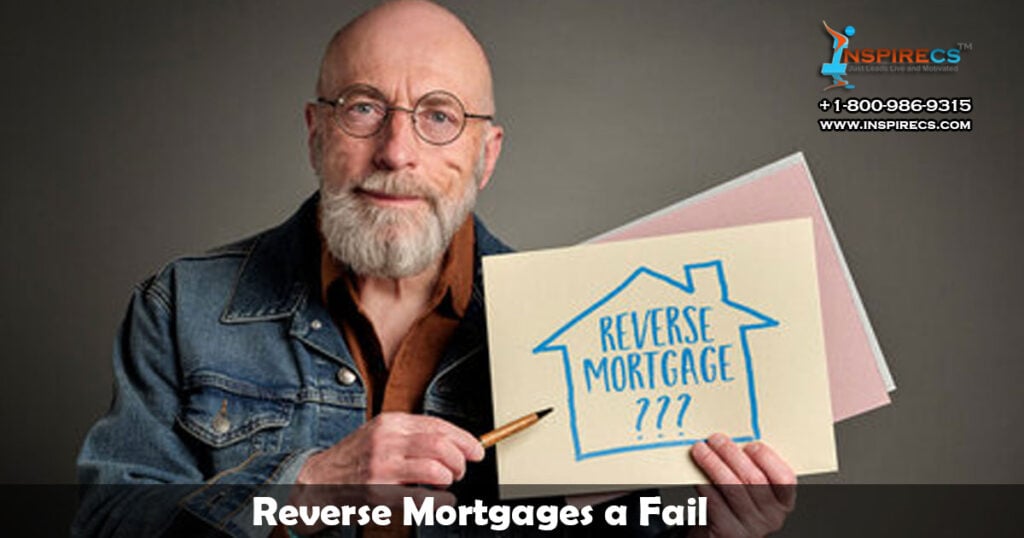
Are you among people who mistakenly consider reverse mortgages a fail? Do you consider reverse mortgages a shame? Well, if you think so, then you are mistaken and we are going to explain in this blog why? Let’s dive deep to find out.
What is a reverse mortgage?
As you know, reverse mortgage refers to a type of loan that homeowners, who are typically 62 years of age or older, can avail of. You may also know that it allows them to convert a portion of the equity in their home into cash. People do not need to sell their homes or make monthly payments. Instead, the loan is repaid only when homeowners sell the home, no longer live in the home as their main residence, or they pass away.
So, we can safely state that a reverse mortgage is a useful tool for some homeowners who want to access the equity in their homes to supplement their income in retirement. However, it is also a fact that it is complex and sometimes expensive. But the question is, whether or not a reverse mortgage is the right choice for you despite the complexity and being expensive. Is a reverse mortgage a fail or is a reverse mortgage a shame? It is not. Let us discuss why and how.
Is a reverse mortgage a fail?
Yes, the reverse mortgage has been stigmatized in the past because of predatory lending practices and high fees. Some people also consider them as a last resort option for older senior citizens who are struggling financially. Therefore, some people consider reverse mortgage shame because of the negative associations that have been attached to them in the past.
However, it is important to know and understand that significant changes have occurred in recent years. Nowadays, reverse mortgages are a legitimate financial tool for certain individuals. They offer a number of key benefits that cannot be underestimated when it comes to valuing reverse mortgages.
Why isn’t reverse mortgage a shame?
Why isn’t reverse mortgage a shame? Because of the numerous key benefits it offers. It is a viable option for older adults who are looking to supplement their retirement income or cover unexpected expenses. Here are a few reasons why reverse mortgages should not be considered a shame:
1. Provides access to equity
As you know, a reverse mortgage allows homeowners to access the equity in their homes. They do not have to sell or move out of their homes. Therefore, it is particularly useful for older adults who have built up significant equity in their homes but are struggling financially to support their retirement.
2. No monthly mortgage payments
Another major benefit of a reverse mortgage is that homeowners do not have to make monthly mortgage payments. Instead, the loan is repaid only when homeowners sell the home, no longer live in the home as their main residence, or they pass away.
3. Flexibility
Reverse mortgages also offer flexibility when it comes to how homeowners receive their funds. They have multiple options such as a lump sum payment, monthly payments, or a line of credit.
4. Government regulations
The Federal Housing Administration (FHA) regulations also make a reverse mortgage a viable tool. These regulations ensure that reverse mortgages remain a safe and viable option for older adults. For instance, regulations like limits on fees and interest rates and requirements for homeowners to receive counseling before taking out a reverse mortgage make a reverse mortgage a superb option.
Where does the problem lie that leads people to think reverse mortgages a shame?
We have explained the reasons why a reverse mortgage isn’t a shame. However, it’s also true that they may have high upfront costs and interest rates, and they may not provide as much financial support as homeowners may expect. Additionally, taking out a reverse mortgage can impact the amount of equity that homeowners are able to pass down to their heirs. However, there are some complications that make reverse mortgage complex and not a fail. So, where does the problem lie that leads people to think of reverse mortgage shame? The problem lies in the fact that people don’t consider certain key factors before finalizing a reverse mortgage deal. With that being said, it is important to consider the following key factors:
1. Understanding the costs
Some reverse mortgage lenders may charge higher fees and interest rates than others. Therefore, it’s essential to meet with a number of lenders or brokers, understand all the costs associated with a reverse mortgage, and choose the one that offers the lowest costs.
2. Planning for the future
A reverse mortgage provides a steady stream of income. However, it may not be the best option for everyone. This is because financial goals vary from person to person. Therefore, it is important to keep your long-term financial goals in mind before finalizing a deal.
3. Maintaining the property
Another key factor you need to consider is that maintaining the property is your responsibility. Additionally, you are also responsible for paying property taxes and insurance. Reverse mortgage lenders may foreclose on your property if you fall behind on these payments.
4. Understanding the repayment terms
Understanding the repayment terms is also crucial because they may adversely affect your estate or heirs.
5. Seeking professional advice
Consult with a financial advisor or housing counselor who specializes in reverse mortgages to ensure that it is the right option for your specific financial situation.
The wrap-up
In conclusion, it is fair to say that reverse mortgage isn’t a shame. People who consider reverse mortgages a fail are mistaken. They don’t consider certain key factors before finalizing a deal. Therefore, it’s important to carefully consider all options and consult with a financial advisor before making a decision about whether a reverse mortgage is right for you or not.



